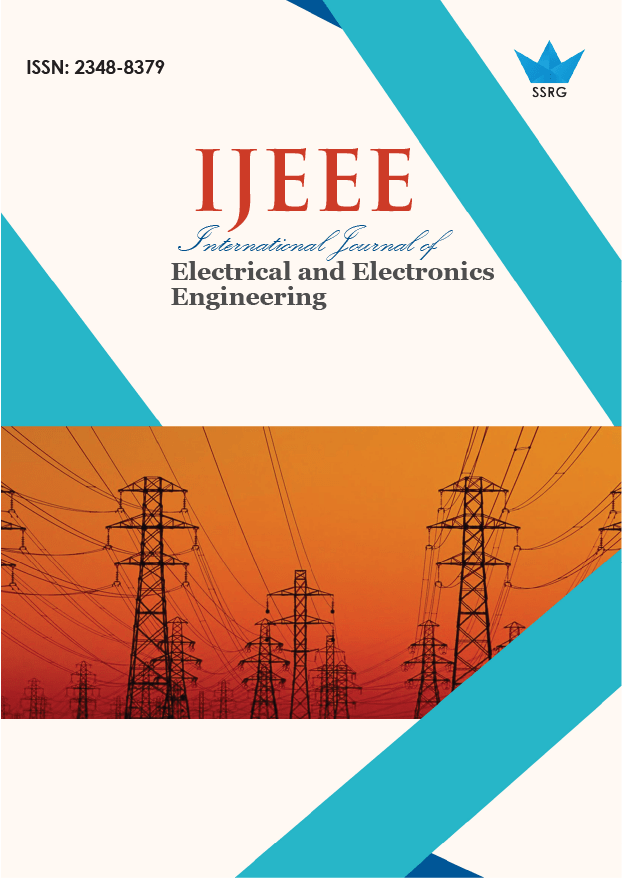Hybrid Neuro-Fuzzy controller based Adaptive Neuro-Fuzzy Inference System Approach for Multi-Area Load Frequency Control of Interconnected Power System

| International Journal of Electrical and Electronics Engineering |
| © 2016 by SSRG - IJEEE Journal |
| Volume 3 Issue 1 |
| Year of Publication : 2016 |
| Authors : O Anil Kumar, Ch Rami Reddy |
How to Cite?
O Anil Kumar, Ch Rami Reddy, "Hybrid Neuro-Fuzzy controller based Adaptive Neuro-Fuzzy Inference System Approach for Multi-Area Load Frequency Control of Interconnected Power System," SSRG International Journal of Electrical and Electronics Engineering, vol. 3, no. 1, pp. 17-25, 2016. Crossref, https://doi.org/10.14445/23488379/IJEEE-V3I1P103
Abstract:
The paper concentrated on an advanced control strategy is proposed in the multi area networks. In this a novel load frequency control technique which is implemented under the power system has unknown variable functions. The system is controlled with the help of adaptive neuro fuzzy interface system arrangement with the integration of LFC at abnormal conditions as unknown parameter considerations. Here a supplementary control algorithm is implemented to eliminate for the errors in the multi area system also to eliminate fuzzy errors and to get good performance H∞ tracking arrangement. Here the neuron functions and LFC techniques are provided for to create the closes loop arrangement with tracking. An advanced control algorithm which is designed to compensate the disturbances by improving the steady stare responses and transient response in the multi area networks. The designed simulink models are testes and verified within MATLAB/SIMULINK with reduced fluctuations in the networks.
Keywords:
Adaptive control, adaptive fuzzy control, fuzzy approximation, GDB, GRC, load frequency control (LFC), multi-area, Anfis controller.
References:
[1] H. Bevrani and T. Hiyama, Intelligent Automatic Generation Control. Boca Raton, FL, USA: CRC press, 2011.
[2] P. Kundur, Power System Stability and Control. New York, NY, USA: Mc-Graw Hill, 1994.
[3] C. Zhang, L. Jiang, Q. H. Wu, Y. He, and M. Wu, ―Delaydependent robust load frequency control for time delay power systems, IEEE Trans.PowerSyst., vol.28, no.3, pp.2192– 2201,Aug.2013.
[4] H. Trinh, T. Fernando, H. H. C. Iu, and K. P. Wong, ―QuasidecentralizedfunctionalobserversfortheLFCofinterconnectedpow ersystems, IEEE Trans. Power Syst., vol. 28, no. 3, pp. 3513– 3514, Aug. 2013.
[5] S. Saxena and Y. V. Hote, ―Load frequency control in power systems via internal model control scheme and model-order reduction, IEEE Trans.PowerSyst.,vol.28,no.3,pp.2749– 2757,Aug.2013.
[6] H. Bevrani and T. Hiyama, ―On load-frequency regulation with time delays: Design and real-time implementation, IEEE Trans. Energy Convers., vol. 24, no. 1, pp. 292–300, Mar. 2009.
[7] H. Shayeghi, H. A. Shayanfar, and A. Jalili, ―Load frequency control strategies: A state-of-the-art survey for the researcher, Energy Convers. Manag., vol. 50, pp. 344–353, 2009.
[8] Ibraheem, P. Kumar, and D. P. Kothari, ―Recent philosophies of automatic generation control strategies in power systems, IEEE Trans. PowerSyst., vol. 20, no. 1, pp. 346–357, Feb. 2005.
[9 ] W. Tan, ―Unified tuning of PID load frequency controller for powerstemsviaIMC, IEEETrans.PowerSystems,vol.25,no.1,Febr uary 2010.
[10] A.KhodabakhshianandM.Edrisi, ―AnewrobustPIDloadfrequency controller ControlEng.Practice, vol.16, pp.1069–1080,2008.
[11] L.Dong,Y.Zhang,andZ.Gao,―Arobustdecentralizedloadfrequency controller for interconnected power systems, ISA Trans., vol. 51, pp. 410–419, 2012.
[12] H. Bevrani, Y. Mitani, and K. Tsuji, ―Robust decentralised loadfrequencycontrolusinganiterativelinearmatrixinequalitiesalgorith m, Proc.Inst.Electr.Eng.— Gener.,Transm.Distrib.,vol.151,no.3,May 2004.
[13] S.VelusamiandI.A.Chidambaram, ―Decentralized biased dual mode controllers for load frequency control of interconnected power systems considering GDB and GRC non-linearities, EnergyConvers.Manag., vol. 48, pp. 1691–1702, 2007.
[14] R. Arivoli and I. A. Chidambaram, ―CPSO based LFC for a twoarea power system with GDB and GRC nonlinearities interconnected through TCPS in series with the tieline, Int.J.Comput.Applications, vol. 38, no. 7, pp. 1–10, Jan. 2012.
[15] N. Hoonchareon, C. Ong, and R. A. Kramer, ―Implementation of an ACE1 decomposition method, IEEE Trans. Power Syst., vol. 17, no. 3, pp. 757–761, Aug. 2002.
[16] J.TalaqandF.Al-Basri, ―Adaptive fuzzy gains cheduling for load frequency control,IEEETrans.PowerSyst.,vol.14,no.1,pp.145–150, Feb. 1999.
[17] A. Abdennour, ―Adaptive optimal gain scheduling for the load frequency control problem, Electr. Power Compon. Syst., vol. 30, pp. 45–56, 2002.
[18] I. Kocaarslan and E. Cam, ―Fuzzy logic controller in interconnected electrical power systems for load-frequency control, Electr. Power Energy Syst., vol. 27, pp. 542–549, 2005.
[19] H.BevraniandP.R.Daneshmand,―Fuzzylogic-basedloadfrequency control concerning high penetration of wind turbines, IEEE Syst. J., vol. 6, no. 1, pp. 173–180, Mar. 2012.

 10.14445/23488379/IJEEE-V3I1P103
10.14445/23488379/IJEEE-V3I1P103